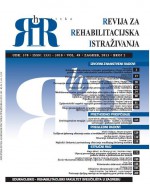Percepcija majki o uključenosti članova obitelji u svakodnevne aktivnosti djeteta s Downovim sindromom
Perception of mothers on the involvement of family members in daily activities of children with Down syndrome
Author(s): Dajana BulićSubject(s): Psychology
Published by: Sveučilište u Zagrebu, Edukacijsko-rehabilitacijski fakultet
Keywords: family; Down syndrome; child with Down syndrome; early intervention; everday life activities
Summary/Abstract: The aim of this study is to determine the repercussions of contemporary monitoring of early intervention in our conditions, that is, in corresponding families, families of children with Down syndrome. The study is particularly focused on the aspect of involvement of family members in everyday life activities of children with Down syndrome and options for support in these families. In addition, the study focuses on the time commitment of members of the family of a child with Down syndrome in everyday life activities. The purpose of the study is also to establish the engagement of parents, relatives and other people in everyday life activities. The study parts from the assumption that a child with developmental disabilities requires more quality time of assistance in everday life activities. The main hypothesis is developed on the basis of assumption that mothers of children with Down syndrome spend significantly more time engaging in daily activities of their children in relation to mothers who have children with typical development. These assumptions were tested on a sample of 30 subjects (15 mothers of children with Down syndrome, 15 mothers of children with typical development). Children were divided into three chronological age groups (6-12 months YOUNG, 1-3 years MIDDLE, 3-5 years OLD). The instrument for examining everyday life activities is constructed particularly for this research. All variables included in the study were calculated using basic statistical parameters through the application of the Kolomogorov-Smirnov test. Factor analysis was conducted. The differences among participants were established and analyzed by means of exhausting and well-formed discriminant analysis. The study clearly demonstrates differences in the engagement and the number of activities of mother, father, relatives and other members in the family who has a child with Down syndrome with respect to the engagement and the number of activities of mother, father, relatives and other members in the family of a child with typical development (with no developmental diffi culties). In most cases the mother is responsbile for the child care, she also does all activities related to the child in both groups of examinees. On the basis of the results of discriminant analysis it is obvious that there is a statistically signifi cant difference in the engagement in everyday life activities depending on the age of children. The results clearly indicate that in families of children with Down syndrome, fathers are statistically less involved in the engagement concerning everyday life activities in relation to fathers in families of children with typical development. One of the interesting findings is that, when it comes to children with disabilities, the proportion of help provided by relatives and other people increases with age.
Journal: Hrvatska revija za rehabilitacijska istraživanja
- Issue Year: 49/2013
- Issue No: 2
- Page Range: 17-27
- Page Count: 11
- Language: Croatian

